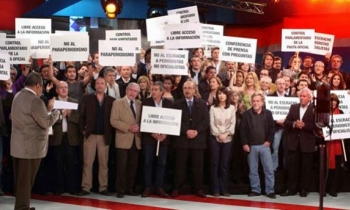The controversy over the publication of cartoons depicting the Prophet Muhammad in European newspapers has unfortunately, but predictably, led us to a debate between free speech versus religious (Muslim) taboos. Some have even, by way of extension and convenience, framed this debate in terms of Samuel Huntington's proposition of a "Clash of Civilizations" between the West and the Islamic world.
Much as the defenders of the publication of the cartoons in Europe try to advance the cause of free speech in this debate, they are actually doing a great disservice to the cause, not only in the Islamic world, but also in many developing countries, and more especially in democratizing countries like Indonesia. They have taken this battle to an arena where we least want it.
This is because the more they invoke free speech, as they are apt to do now, the more fuel they are giving to the opponents of free speech in these developing countries.
Sadly, there is never a shortage of such opponents.
Beyond the usual suspects -- the radical groups and the tyrannical rulers -- there are others who are rapidly jumping on the bandwagon in using the Danish cartoons as examples of what freedom of expression can do to society.
And as the controversy intensifies, as no doubt it will in the coming weeks, the middle ground will erode, with people being asked to take a stand on these cartoons.
Proponents of free speech in Indonesia, as no doubt in most other predominantly Muslim countries, will have to openly condemn the European media for publishing the provocative cartoons, and probably condemn the European governments too for their inaction.
The cartoons reflect poor taste, ignorance, arrogance and very poor judgment on the part of the editors. If free speech means being associated with these cartoons and the right to insult others, then many people, even the staunchest supporters of freedom, will want to keep their distance.
By doing this, they are inadvertently aligning themselves with the anti-free speech camp.
As with most debates, there is hardly any middle ground. It's one of those awkward "with us or against us" situations all over again. Either you defend the cartoons or you condemn them. And either you are for free speech, or you are against free speech.
Why newspapers in Europe should want to publish these cartoons really baffles the mind. No self-respecting editor, and one who is truly concerned with freedom of speech, should be associated with the cartoons, much less publish them.
One can only speculate about the motives behind their publication: business considerations, or political or some other self-serving interests. It's hard to believe that free speech in Europe was ever in danger in the wake of this cartoon controversy.
But neither free speech nor democracy for the more than 1.2 billion people living in the Islamic world is foremost in their minds. George W. Bush is probably much more serious in bringing democracy to the Middle East. And if Bush is trying to export American democratic values by sending his troops to Iraq, the Europeans are lobbing their own "weapons of mass destruction" in the form of these cartoons from a safe distance.
The cartoon controversy will subside sooner or later, but beyond giving a bad name to free speech, it will leave a long lasting and detrimental impact on the people in many countries, including Indonesia, in terms of the struggle for their own freedom of speech and democracy.
Before the cartoon controversy erupted last week, opponents of free speech in Indonesia had Playboy's plan to publish an Indonesian edition to use as a weapon in furthering their cause.
Now they have a bigger and more powerful weapon to hit free speech with. The cartoons make Playboy virtually irrelevant by comparison. They will constantly refer to these cartoons as a compelling example of why free speech is bad for society.
The publication of the cartoons, and the way the European media has been up in arms defending them and thus perpetuating the controversy, is the worst kind of publicity that the proponents of free speech in the Islamic world could ask for. For now, and probably for the coming years, many of us might as well bury our heads in the ground.









